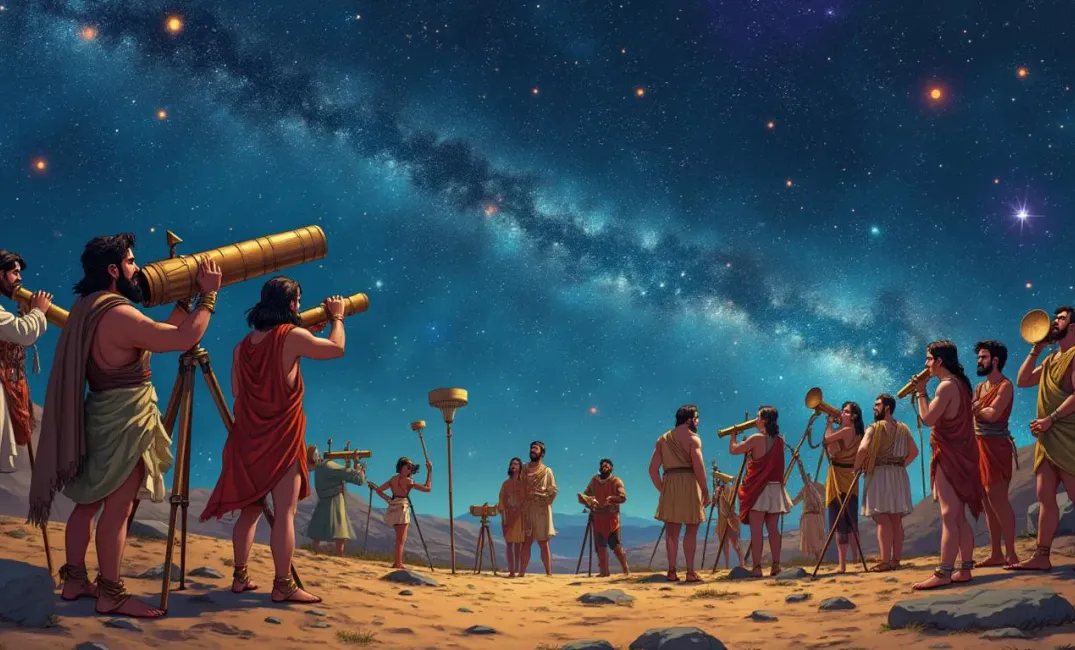Introduction: A Journey Through the Cosmos
"To confine our attention to terrestrial matters would be to limit the human spirit." — Stephen Hawking
Humanity's fascination with the stars is as ancient as our beginnings. From prehistoric stargazers to modern astrophysicists, the quest to understand the cosmos has driven technological innovation, philosophical inquiry, and artistic inspiration. This entry explores the remarkable legacy of human astronomy, a discipline interwoven with the human experience, that has charted the course toward our cosmic future.
Ancient Stargazers: The Origins of Astronomy
Primitive Observations and Alignments
- Stone Age Structures: Monolithic sites like Stonehenge and Newgrange indicate early human attempts to track celestial bodies. These structures aligned with solstices, signposting the seasons' cyclical nature and signifying an embryonic understanding of astronomy.
- Star Gazing in Myth and Religion: Ancient cultures integrated celestial phenomena into mythology and religious practices. The movements of planets and stars were often deified, guiding agricultural practices and societal rituals across Egyptian, Mayan, and Mesopotamian civilizations.
The Development of Calendars
- Lunar and Solar Calendars: Early calendars, like the Babylonian and Egyptian, facilitated agricultural planning and religious ceremonies. Their accuracy reflected sophisticated observations of celestial cycles, foundational to human survival and societal organization.
- Maya and Inca Astronomy: Mesoamerican civilizations developed complex calendar systems, reflected in the precise astronomical alignments of their architecture. The Maya's calendar predicted celestial events with remarkable accuracy, underlying their cosmology and cultural identity.
Classical Advancements: Foundations of Modern Astronomy
Greek Contributions to Celestial Understanding
- The Geocentric Model: Early Greek philosophers like Ptolemy advanced the geocentric model, positioning Earth at the universe's center. While incorrect, this model fostered mathematical and observational disciplines, illustrating the iterative nature of scientific exploration.
- Pioneers of Observation: Figures like Hipparchus and Eratosthenes initiated systematic star cataloging and accurately estimated Earth's circumference, showcasing remarkable astronomical ingenuity well ahead of their time.
Islamic Golden Age: A Renaissance of Celestial Inquiry
- Translation and Expansion of Knowledge: Islamic scholars translated Greek texts and expanded upon them, leading to significant advancements in astronomy. Observatories flourished, with scholars like Al-Battani refining planetary models and almanac systems.
- Innovations in Tools and Measurement: Innovations like the armillary sphere and astrolabe enabled precise celestial measurements, serving both astronomical and navigational purposes across the Islamic world and into Europe.
The Scientific Revolution: A New Astronomical Paradigm
Heliocentrism and the New Worldview
- Nicolaus Copernicus: By proposing a heliocentric universe, Copernicus initiated a paradigm shift. His model, articulated in De revolutionibus orbium coelestium, destabilized established doctrines and catalyzed scientific inquiry towards a more accurate cosmic understanding.
- Galileo and the Telescope: Galileo’s telescopic observations—Jupiter’s moons and Venus's phases—provided evidence for the Copernican model, challenging the geocentric status quo and laying groundwork for future optic-based exploration.
Isaac Newton and Universal Gravitation
- Newton's Laws of Motion: Newton's formulation of gravity as a universal force elegantly explained celestial motions and validated heliocentric views. His synthesis of physics and astronomy transformed the scientific landscape, bridging Earthly phenomena and cosmic processes.
- The Birth of Astrophysics: Newtonian physics heralded the era of astrophysics, encouraging observational and theoretical strides that connected observed cosmic phenomena with underlying physical laws.
Modern Astronomy: Unveiling the Universe
The Age of Discoveries
- Herschel’s Milestones: Astronomer William Herschel’s discovery of Uranus and infrared radiation expanded the known universe. His efforts in cataloguing the stars illuminated the expanse beyond the visible range, deepening humanity’s grasp of the cosmos.
- Edwin Hubble and the Expanding Universe: Hubble’s observations of redshifted galaxies revealed the universe's expansion, revolutionizing cosmology and leading to the formulation of the Big Bang theory—a cosmic narrative of origins unifying faith and science.
Technological Innovations
- Space Telescopes and Observatories: The Hubble Space Telescope and radio observatories have provided unprecedented clarity, unveiling complex phenomena like black holes and distant galaxies, and continually redefining our understanding of the universe.
- Groundbreaking Missions: Missions like Voyager and Cassini have journeyed into our solar system, capturing breathtaking imagery and data that inform planetary science and inspire infinite curiosity about the interstellar realm.
Future Frontiers: Humanity’s Cosmic Ambitions
Space Exploration and Colonization
- Mars and Beyond: The human fascination with Mars signals a potential new frontier, as envisioned by space agencies and private enterprises like SpaceX, fostering hopes of interplanetary colonization and a multiplanetary existence.
- International Collaborations: Collaborative efforts, such as the International Space Station, underscore ambitions for unified space exploration, pooling resources and knowledge to propel humanity into deeper cosmic territories.
Challenging the Unknown
- Dark Matter and Energy: Unraveling the mysteries of dark matter and energy remains a paramount focus. These enigmatic forces comprise the majority of the universe's content, their study potentially illuminating unforeseen truths about the cosmic architecture.
- Exoplanetary Exploration: With thousands of exoplanets discovered in habitable zones, the search for extraterrestrial life continues to intrigue scientists, with missions aimed at detecting biosignatures fostering anticipations of an interconnected cosmic ecosystem.
Conclusion: Astronomy as Humanity’s Celestial Legacy
"The more clearly we can focus our attention on the wonders and realities of the universe, the less taste we shall have for destruction." — Rachel Carson
Astronomy is an odyssey of exploration, reflection, and aspiration. It intertwines concrete science with philosophical musings, anchoring humanity's place in the vast cosmos. With each celestial discovery, humanity broadens its horizons, nurtures its collective spirit, and fosters hope for a harmonious, prospective cosmic future.
As you ponder the legacy of human astronomy, embrace its potential to inspire cosmic stewardship, celebrate innovation, and cherish the interconnectedness woven into the very fabric of the universe. May this understanding guide and uplift, reaffirming our enduring pursuit of knowledge, wonder, and unity across both terrestrial and celestial boundaries.
OBSERVATION, SCIENCE, STARGAZERS, ASTROPHYSICS, INNOVATION, COSMIC, FUTURE, ASTRONOMY, EXPLORATION, UNIVERSE

